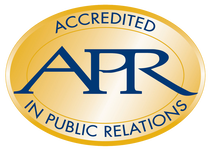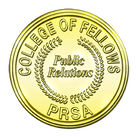ACCREDITATION RENEWAL
Accredited professionals must renew their credential and commitment to the sound and ethical practice of public relations every three years (and a renewal fee of $75.00). Accreditation Renewal can be achieved through establishing Continuing Education Unites (CEU).
A CEU equals 10 hours of participation in UAB approved training or other professional development activities. For APRs: A minimum of 15 CEUs is required for renewal over the three-year period; at least seven CEUs must be in continuing education and professional development and one CEU in ethics. For APR+Ms: A minimum of 30 CEUs is required for renewal over the three-year period; at least seven CEUs must be in continuing education and professional development, one CEU in ethics and 15 CEUs in military public affairs. CEU’s can be achieved by activities such as mentoring candidates through the Accreditation process, joining a panel for a candidate's Panel Presentation, teaching an APR prep course class at the local level or be an APR Online Course Facilitator, speaking publicly or publish on the topic of public relations, among others. Contact us if you wish to get involved with your local chapter.
For more information on renewing your APR and access to the renewal application, please visit the National PRSA APR website.
Accredited professionals must renew their credential and commitment to the sound and ethical practice of public relations every three years (and a renewal fee of $75.00). Accreditation Renewal can be achieved through establishing Continuing Education Unites (CEU).
A CEU equals 10 hours of participation in UAB approved training or other professional development activities. For APRs: A minimum of 15 CEUs is required for renewal over the three-year period; at least seven CEUs must be in continuing education and professional development and one CEU in ethics. For APR+Ms: A minimum of 30 CEUs is required for renewal over the three-year period; at least seven CEUs must be in continuing education and professional development, one CEU in ethics and 15 CEUs in military public affairs. CEU’s can be achieved by activities such as mentoring candidates through the Accreditation process, joining a panel for a candidate's Panel Presentation, teaching an APR prep course class at the local level or be an APR Online Course Facilitator, speaking publicly or publish on the topic of public relations, among others. Contact us if you wish to get involved with your local chapter.
For more information on renewing your APR and access to the renewal application, please visit the National PRSA APR website.
FAQ
Why are we making changes to the program?
In 2018, the Universal Accreditation Board (UAB) performed an extensive review of the APR/APR+M Maintenance Program. Of the findings, a few key program changes were recommended and approved, including the program name, fees, and the points system. Changes were made to align the APR/APR+M processes and procedures with current standards and best practices for professional development programs. These changes will allow for better use of technology, member-tracking capabilities and overall process
improvement.
improvement.
What is changing and when are the changes taking place?
Program changes have been implemented in a phased approach, beginning in 2019 to 2020. Effective January 1, 2019, the name of the APR/APR+M Maintenance Program changed to Accreditation Renewal. The renewal fee increased to $75. The fee cycle remains a three-year period. Effective January 1, 2020, the UAB has established the Continuing Education Unit (CEU) as the unit of Accreditation Renewal.
Why did we change from points to CEUs?
CEUs better align with industry best practices and provide an easier, more efficient program renewal process. A CEU-based unit system helps eliminate disparities with points based on actual time spent on renewal activities. Additionally, CEUs will be easily accommodated in most automated systems that may be put in place in the future. This is the right step toward full system automation and tools, such as an online tracker, for real time input and an online renewal process to replace the current manual form.
How does the new CEUs system work?
A CEU equals 10 hours of participation in UAB approved training or other professional development activities.
- For APRs: A minimum of 15 CEUs is required for renewal over the three-year period at least seven CEUs must be in continuing education and professional development and one CEU in ethics.
- For APR+Ms: A minimum of 30 CEUs is required for renewal over the three-year period; at least seven CEUs must be in continuing education and professional development, one CEU in ethics and 15 CEUs in military public affairs.
I am already in my three-year renewal cycle; do I start with CEUs immediately?
The CEUs will apply for APRs who earned Accreditation January 1, 2020, or later. Accredited members who are already in a Renewal cycle will remain on the point system until their current cycle is completed. Once you begin a new Renewal cycle, you will be required to earn CEUs versus the points. All Accredited practitioners will be on the CEU-based Renewal system by 2022.
How do I know when I will change from the “points” system to CEUs?
APRs/APR+Ms who renew on 12/31/2021 will use the Renewal Application that is based on points. APRs who earned their APR in January 2020 or later, and APRs who need to renew after January 1, 2022 will use the Accreditation Renewal Application based on CEUs.
How do I find out my renewal date?
To see your APR Renewal date, log onto MyPRSA account (www.prsa.org). If you have trouble logging on, simply click “Forgot My Password” and the link to set a new password will be emailed to you.
Why was an Ethics requirement added?
Ethical practices are an imperative component for continuing education for all communication/public relations professionals. Earning the APR/APR+M credential denotes that the practitioner has achieved a high level of mastery of the knowledge, skills, and abilities associated with the practice of public relations, including a strong emphasis throughout the process and understanding of ethical standards. As the conscience of the organizations we serve, APR/APR+M practitioners have an obligation to remain current in
this area.
this area.
Will the new CEUs system require me to complete a lot more time than I had to before?
Although the new system includes a slight increase in hours, it will most likely feel unrecognizable to most Accredited practitioners. Renewal applications consistently indicate a majority of our members exceed the required time/points than is required. The new CEUs system should not create more time strain on practitioners, rather it will help practitioners log their time more accurately with real time versus a points system conversion process, which introduces variance and inconsistencies.
Does switching to CEUs mean we will only have to complete continuing education courses
for renewal?
for renewal?
Not at all, there are many ways you can earn your approved renewal activities and training. Some examples of approved activities other than continuing education courses and training include Leadership in Public Relations, Service to the Profession, Awards for Significant Contributions in Public Relations, Public Service, Professional volunteerism, Presentations and Speeches, and Published Works that Contribute to the Practice of Public Relations.
If I am a PRSA Fellow, am I still exempt from Renewal requirements?
Yes, PRSA Fellows remain exempt from the Renewal process.
If I was exempt under the Maintenance point system, am I still exempt under the new
Renewal CEU system?
Renewal CEU system?
Yes, all Accredited members who are designated as exempt from renewal will remain exempt under the Renewal system.
If I have more questions, where should I go?
To learn more, visit accreditation.prsa.org
PRSA COLLEGE OF FELLOW
The PRSA College of Fellows, founded in 1989, is the gold standard of the world’s largest association of PR professionals. The significance and distinction of the ‘Fellow PRSA’ designation after one’s name are akin to the Academy Award of public relations. The words ‘career pinnacle’ are often used to explain the gravitas of the College of Fellows. A rigorous peer review process has singled out these professionals to be among the ‘best of the best.’
To be considered for admission to the College of Fellows, PRSA members must meet a stringent list of qualifications and complete the application process by the applicable deadlines. Applications are reviewed by the Fellows Selection Committee, which recommends new Fellows to the PRSA National Board of Directors for approval.
The PRSA College of Fellows, founded in 1989, is the gold standard of the world’s largest association of PR professionals. The significance and distinction of the ‘Fellow PRSA’ designation after one’s name are akin to the Academy Award of public relations. The words ‘career pinnacle’ are often used to explain the gravitas of the College of Fellows. A rigorous peer review process has singled out these professionals to be among the ‘best of the best.’
To be considered for admission to the College of Fellows, PRSA members must meet a stringent list of qualifications and complete the application process by the applicable deadlines. Applications are reviewed by the Fellows Selection Committee, which recommends new Fellows to the PRSA National Board of Directors for approval.
Membership Criteria
Find out more information on the PRSA College of Fellows.
- Current PRSA membership
- Minimum of 240 months public relations and communication experience
- Current accreditation in Public Relations (APR)
- Demonstrated superior professional performance in the practice/teaching of public relations
- Advanced the profession
- Contributed to the profession or the community through service and leadership
- Served as a role model in the profession and the community
Find out more information on the PRSA College of Fellows.



